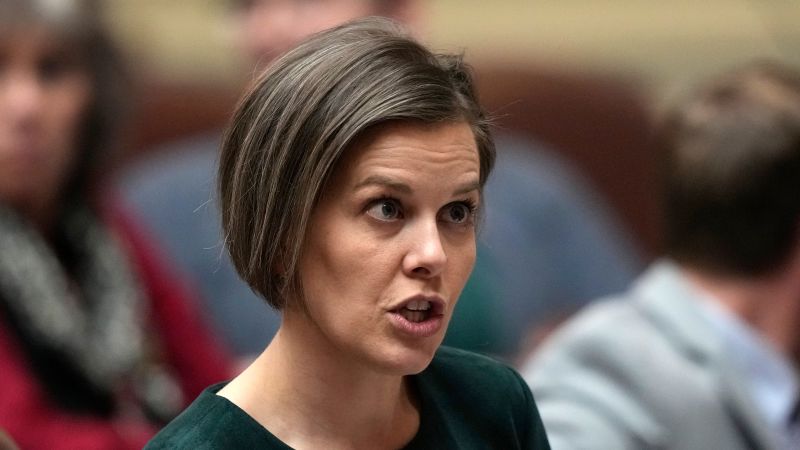In a significant move, the U.S. Supreme Court has granted a temporary order directing the Maine legislature to restore full voting rights to state Representative Laurel Libby, a Republican. This decision comes after Libby was censured for a provocative social media post criticizing the participation of transgender athletes in girls’ sports. The ruling opens a complex discussion around free speech, legislative conduct, and the legal implications of censorship.
On Tuesday, the Supreme Court’s unsigned decision did not disclose the justices’ reasoning, which is typical in emergency applications. However, the order did prompt dissenting opinions from Justices Sonia Sotomayor and Ketanji Brown Jackson—highlighting the contentious nature of Libby’s case.
Libby, who represents Auburn, Maine, was censured earlier this year by a Democrat-controlled House after she publicized a Facebook post criticizing a transgender student athlete who had won a state championship pole vaulting competition. Her post, which gained national attention, included the names and images of the athletes involved, igniting fierce debates about the intersection of sports, gender identity, and free speech rights.
Background of the Censure
The controversy began in February when Representative Libby publicly criticized a transgender student’s participation in a high school girls’ sports event. Critics accuse Libby of engaging in fear-mongering and vilification of transgender athletes, which has raised alarms among advocates for LGBTQ+ rights. The inclusion of personal identifiers in her posts further escalated attention to the delicate legal and social dynamics surrounding these discussions.
Following her censure, which stripped her of her voting rights and prevented her from participating in debates, Libby promptly filed a lawsuit claiming that her First Amendment rights were violated and that her constituents were being disenfranchised. In her view, the legislature’s action was not merely punitive but also politically motivated, aimed at suppressing dissenting opinions on the contentious topic of transgender participation in sports.
The Supreme Court’s Ruling
The Supreme Court’s ruling to restore Libby’s voting powers temporarily reflects the urgent legal questions involved. Notably, it emphasizes the Court’s willingness to revisit traditional limitations on its authority, as pointed out by Justice Jackson in her dissent. Jackson expressed concern about the Court’s decision to intervene in cases where an emergency was not evident, suggesting this may set a troubling precedent.
“Not very long ago, this court treaded carefully with respect to exercising its equitable power to issue injunctive relief at the request of a party claiming an emergency,” Jackson noted in her dissent.
This dissent raises critical questions about the role of the Supreme Court, particularly in politically sensitive disputes. Jackson argued that the Court’s hasty decision overlooked crucial principles regarding judicial restraint. Advocates on both sides of the aisle are watching closely to see how the Court will navigate this politically charged landscape.
Implications for Future Legislation
The implications of this ruling extend beyond the immediate case of Libby. As discussions about transgender athletes and inclusion in sports continue, this ruling may signal a new chapter in debates regarding the intersection of sports, gender, and free speech. Lawmakers across the United States are now reconsidering their positions on similar issues as a result of this case.
- This case highlights the complexities surrounding First Amendment rights in legislative settings.
- Lawmakers may face increased scrutiny over their decisions regarding censure and privilege stripping.
- The ruling could influence similar debates occurring in other states, especially those with laws against transgender athletes competing in sports.
Public Reaction and Moving Forward
The public reaction to this case has been polarized. Supporters of Libby argue that her First Amendment rights and the rights of her constituents to be represented are being upheld. In contrast, opponents view her actions as damaging and harmful to the transgender community, characterizing her censure as necessary to ensure safe and respectful dialogue around sensitive issues.
As this case unfolds, it stands as a critical moment in the ongoing battle over LGBTQ+ rights and representation in governance. With upcoming legislative sessions on the horizon, all eyes will be on Maine’s legislature as they navigate the troubling waters of public policy and civil rights.
This situation exemplifies the broader societal conflicts regarding gender identity and the laws governing participation in sports. With education, advocacy, and legal challenges intersecting, it is evident that this discourse will continue to evolve as new dimensions of these debates emerge.
Conclusion
In summary, the Supreme Court’s temporary restoration of Laurel Libby’s voting power invites further scrutiny on the complex interplay between legislative authority, individual rights, and the ongoing dialogues surrounding gender in sports. As legal opinions clash and public sentiment sways, this case encapsulates a pivotal moment that could influence future policies nationwide.

